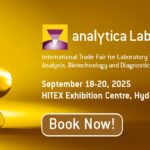In Conversation with Mr Dinesh Arumughan | Director – Customer Support at Fette Compacting India
With continuous manufacturing and Pharma 4.0 maturing rapidly, support is no longer an endpoint function. How are you reengineering service strategy to integrate more tightly with manufacturing intelligence, real-time decision-making, and process control?
Mr. Arumughan: We see service as a continuous, value-driving function that provides support along the whole OSD lifecycle – from lab to production. Our strategy is built on Quality by Design (QbD) principles – we support the identification of Critical Material Attributes (CMAs) and Critical Process Parameters (CPPs) early in development, ensuring smoother scale-up and fewer deviations during production.
Tools like SmartInterface for real-time monitoring, ePAT for embedded process analytical technology to ensure in-line quality control, and LiveGuide for secure remote support are all tightly integrated into our service operations. We also rely on our Qualified Expert Database (QED), which captures decades of tablet compression expertise, helping us provide faster, knowledge-backed responses that enhance decision-making and process control.
Tablet presses today are sensor-rich, software-driven, and mechanically precise – when failures occur, is the challenge more about interpreting complex data streams or about narrowing down operator or process-induced deviations?
Mr. Arumughan: The challenge lies in data interpretation. Our support teams use tools like ePAT, Process Emulators and BU/TU sensors to analyze trends, detect anomalies, and in-line quality control 100% of the produced tablets with our Tablet Uniformity (TU) sensor. With QbD principles and access to the QED knowledge base, we can correlate process behavior with formulation variables or operator inputs. This capability allows our engineers to diagnose faster and advise on preventive actions – reducing recurring issues and improving long-term reliability.
In highly regulated environments where every intervention must be auditable, how do you maintain speed and flexibility in support without compromising on documentation, traceability, and compliance?
Mr. Arumughan: Compliance and agility can absolutely co-exist — when the right systems are in place. Our digital platforms like LiveGuide and SmartInterface are fully aligned with global regulatory requirements, including 21 CFR Part 11. They allow us to deliver fast, remote support while ensuring every session is recorded, all actions are documented, and system access is fully validated.
We also provide cGMP-compliant service documentation, automated data logging, and digital spare parts traceability through tools like eCAT. Together, these systems enable us to maintain full transparency and audit readiness — without slowing down our response times. It’s about creating a support ecosystem that’s both agile and compliant, by design.
As pharma plants globalize but service standards are expected to be uniform, what operating model have you found most effective in balancing centralized expertise with regional autonomy, especially for remote or resource-constrained geographies?
Mr. Arumughan: We follow a hybrid model: centralized knowledge, locally empowered execution. Our five global Competence Centers – including the one in Goa – provide a knowledge backbone and digital connection. Regionally, our 30+ certified engineers and service experts are equipped to respond quickly with full technical capability. For remote areas, tools like LiveGuide and alva, our digital learning platform, ensure support and knowledge transfer without the need for travel. This model helps us maintain global standards with local flexibility.
Virtual commissioning, remote troubleshooting, and AR-based diagnostics are gaining traction, which of these technologies have truly moved beyond the hype in your service operations, and what have they tangibly improved in terms of cost or response time?
Mr. Arumughan: Platforms like LiveGuide and SmartInterface have truly moved beyond the hype. They’ve become integral to our support model, enabling us to resolve issues remotely with precision and speed. We’ve reduced unnecessary travel and downtime significantly. What makes them even more effective is how we combine them with QbD principles and our QED – ensuring that any solution we offer is backed by both real-time data and historical expertise. Tools like the F Lab Series and process emulators also accelerate tech transfer and scale-up by replicating real conditions with minimal material usage, improving cost efficiency.
There’s a growing demand for support teams to be knowledge enablers, not just fixers, how are you training your frontlines to interpret machine behavior, guide root cause resolution, and transfer capability to the customer side?
Mr. Arumughan: Our training goes far beyond mechanical troubleshooting. Every service engineer is trained in QbD fundamentals – understanding how material properties affect process outcomes – and is equipped with access to QED for on-demand insights. Through alva, our digital learning platform, and hands-on modules at our Competence Centers, our teams gain cross-disciplinary expertise in process engineering, compliance, and digital tools. This enables them not just to fix issues, but to empower customers to understand their machines better and build long-term capability.
Service in the pharma domain is becoming as strategic as the equipment itself. In your view, what will differentiate support leaders in the next decade – will it be analytics-driven service contracts, autonomous diagnostics, or embedded lifecycle partnerships?
Mr. Arumughan: Support leaders will be those who can partner with customers from lab to production – not just as service providers, but as enablers of faster, safer, and more efficient outcomes. Our approach is rooted in Quality by Design (QbD), where critical material attributes and process parameters are identified early and refined through robust process development. We complement this with QED, our Qualified Expert Database, which consolidates over 75 years of global expertise to support faster, evidence-based decisions.
Using tools like the F Lab Series for early material characterization, process emulators for validation of the feeding process, and platforms like LiveGuide and SmartInterface for real-time remote support, we help customers shorten development timelines and scale up with confidence. The differentiator isn’t just technology – it’s the ability to combine pharmaceutical knowledge, digital tools, and real-world experience to walk the journey with our customers, from concept to commercial success.






